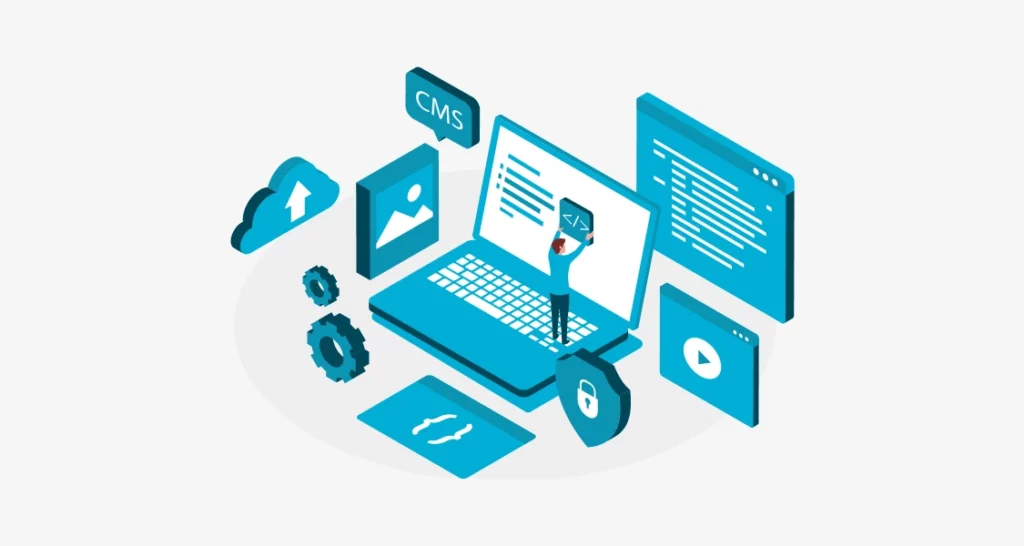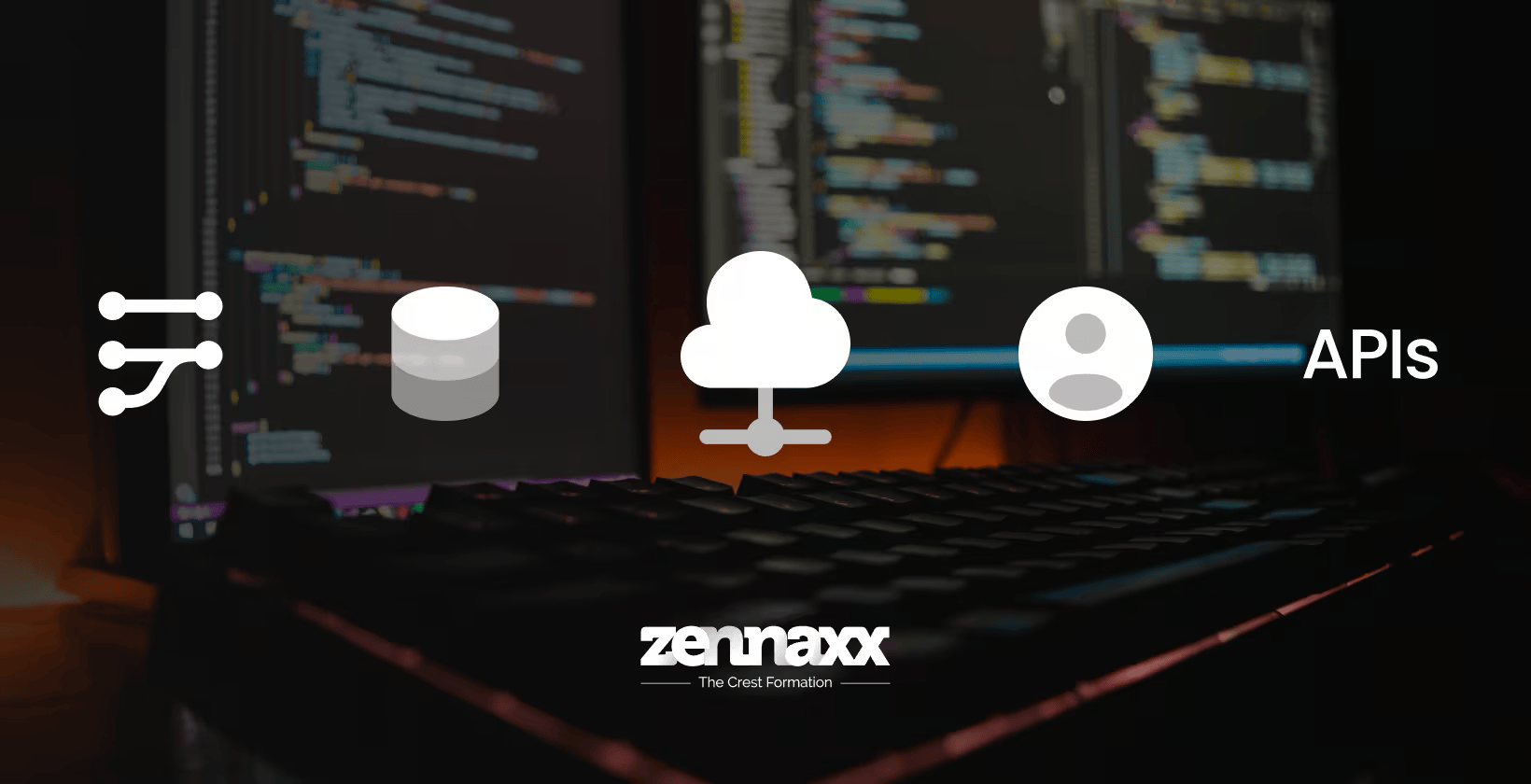A tech project manager of the next big tech startup looked blankly at his monitor. His heart was sinking. The last release was a train wreck of bugs, missed deadlines, and overworked teams. The first word that came to his mind was“ DevOps!” “What would have happened if I used it?” he thought.
This is the story of several project managers and software development teams, even in 2024!
With the focus on mobile in modern software development, the role of DevOps in app development has become crucial. It enables faster releases and fewer defects, allowing businesses to scale operations quickly.
Such benefits have led to a DevOps market reaching revenues worth $10.4 billion, indicating how more organizations are embracing this methodology.
You’re missing out on an excellent opportunity to release your app faster and smoother if you are still not using DevOps.
This article will discuss DevOps in app development and provide you with the six Cs of successful implementation.

What is DevOps?
DevOps is an amalgamation of “Development” and “Operations.” This name perfectly captures the essence of its end goal: connecting the Dev and Ops teams.
So, let’s demystify it before we understand what role DevOps plays in mobile apps.
DevOps allows organizations to improve collaboration between development and operations teams. These teams share tools, techniques, and objectives to develop mobile apps faster and more efficiently.
What makes DevOps an essential practice for most businesses is the agility to respond to changing customer needs while maintaining quality and user experience.
But is DevOps, to some extent, similar to Agile?
No, it isn’t.
How is DevOps Different From Agile App Development?
DevOps aims to improve software delivery by breaking the silos between ops and dev teams following the conventional approach of app development.
Agile targets an iterative development approach that creates dynamic responses to change and customer feedback. Both methodologies aim to provide rapid response and efficiency in app development.
While Agile may have specific limitations, DevOps extends beyond the dev and ops team. You can implement DevOps culture across the organization so that cross-functional teams can collaborate and enhance software delivery.
The Roles of DevOps in App Development
DevOps changes how we build and support mobile applications, creating streamlines and effective processes. It fills the gap between cross-functional teams and manages the entire development lifecycle.
Below are the critical roles of DevOps in app development.
#1. Enhance Collaboration and Communication
DevOps makes teams unify IT ops and developers to work as one entity. Think of a team composing code for a new app feature while setting up the release environment.
DevOps plays a significant role in app development by ensuring seamless team collaborations. This includes,
- Encourages different teams to share knowledge and work together towards common goals.
- The open communication approach from DevOps improves constant connection
- Faster task completion and asynchronous collaborations improve agility
- A high level of trust infused by DevOps culture improves decision-making among teams
#2. Improve app Quality and Reliability
DevOps is not only about speed; it offers higher app quality and reliability. DevOps teams conduct continuous testing to identify bugs and resolve them on time. For example, a banking application that updates without interruptions or data loss.
The role of DevOps in such apps is significant, with every release improving on the last after its implementation.
But how does DevOps ensure better quality?
It helps you by,
- This includes continuous testing and integration, where every change to the codebase is automatically tested.
- Automated testing, deployment, and monitoring ensure consistent quality at every stage.
- Employing a shared responsibility among teams for quality results with better communication, faster feedback loops, and a collective focus.
- Allowing teams to identify and fix issues sooner, preventing them from reaching production.
#3. Enhancing app system’s scalability and stability
DevOps is crucial in making app systems more scalable and stable. Automating deployments, DevOps allows apps to effortlessly handle peak loads without compromising performance.
This adaptability ensures an e-commerce app remains responsive even during massive sales events.
DevOps ensures scalability by implementing CI/CD pipelines and automating deployments across systems. With the dev and ops team continuously testing the system and working on errors, system stability can be ensured.
#4. Acceleration of app Delivery
DevOps streamlines every development phase, from coding to deployment. This means updates and features reach users faster than ever.
For instance, a social media platform can rapidly roll out new filters or features, ensuring higher engagement and a competitive advantage.
Accelerated feature delivery emphasizes the role of DevOps in app development. If you are a business looking to enter a market and timing the product right, DevOps implementation is what you need!
#5. Cost Reduction
DevOps is not only about velocity but also about an approach that keeps your development budget optimized. Consider how a company can save money by avoiding a massive software glitch!

It can save the cost of recalling a product or recovering crucial data. Catching a bug early and automating processes by implementing DevOps can result in significant cost savings.
#6. Encourage Continuous Learning and Improvement
DevOps fosters an environment where continuous learning and improvement are part of the daily routine. This culture encourages teams to experiment, fail, and learn faster. It turns mistakes into lessons, driving innovation and efficiency forward.
Understanding DevOps’s role in modern app projects is essential. It ensures faster delivery, better quality, and higher customer satisfaction. Now that you know DevOps’s role in your app development project, here are some key benefits.
Benefits of Adopting DevOps
DevOps feels like unlocking a secret level in app development. It’s all about teamwork, speed, and getting things right.
So, here are the standout perks of using DevOps.
#1. Better Time-to-market
DevOps drastically reduces the time needed to release new iterations by automating the deployment process.
Imagine pushing out app updates in days instead of weeks. It’s like having a fast-forward button for your app development process.
#2. Efficient Resource Management
DevOps maximizes resource efficiency, eliminating waste through automation and collaboration.
For example, automated testing frees up developers for more critical tasks, optimizing team productivity. It’s intelligent resource management in action, ensuring nothing is squandered.
#3. Eliminate Bottlenecks
DevOps streamlines workflows, removing bottlenecks that delay app releases. Continuous integration, for example, allows instant feedback on code changes, preventing logjams.
This method keeps development moving smoothly, enhancing project timelines.
#4. Better Feedback
DevOps encourages continuous feedback, which is crucial for refining apps. This loop allows for immediate improvements, enhancing user satisfaction. For instance, any user-reported issue can be addressed in the next update cycle, keeping the app in line with user expectations.
Applying DevOps is like supercharging your app development process. It’s not just about making things faster; it’s about being smarter and more in tune with users’ needs.
Want to Automate Your Business Process With a Software Solution?
Zennaxx, a leading software development firm in Canada, has delivered 700+ bespoke solutions spanning various industries.
Challenges with Mobile DevOps
The DevOps journey brings its own set of obstacles. It’s a field where precision and adaptability collide. Here are the hurdles that teams often face.
#1. Different OS version
Every mobile app platform is different. Take Android and iOS. Both have different native requirements crucial for mobile app development projects.
So, if you are applying for DevOps, you must be mindful of the difference between native environments and platform-specific requirements.
#2. Hardware
From high-end smartphones to more modest devices, your app needs to work seamlessly across the board. Picture a gaming app that must deliver the same latency and immersive experience on every device.
So, you need a well-planned DevOps strategy to overcome the challenges of hardware-based issues across platforms and devices.
#3. Keeping a balance between App Quality and Consumer Demands
Balancing app quality with consumer demands has always been challenging for businesses. Users want cool new features, but not at the expense of performance or reliability.
The changing market dynamics and consumer demands keep changing, which means your DevOps implementation needs more adaptability.
Further, DevOps plays a crucial role by providing quick and responsive updates.
These challenges test the resilience and innovation of DevOps teams.
Overcoming them is critical to delivering stellar mobile experiences.
The 6 Cs of DevOps Adoption
DevOps is a framework built on key principles for successful adoption. Here are the 6 Cs that will help you adopt DevOps successfully.
#1. Continuous Planning
Continuous planning is about keeping your strategy agile and your goals aligned.
Imagine plotting your app’s journey on a constantly evolving map. It’s a way to stay ahead of changes and ensure your team knows where they’re headed next.
This stage is about creating a roadmap of DevOps implementation across the organization. You need to define roles, teams, and tasks for strategic implementation.
#2. Continuous Integration
Continuous integration involves combining code written by different team members frequently.
This approach catches conflicts and errors early. For instance, when a developer adds a new feature, it’s integrated and tested immediately, ensuring it meshes well with the existing app.
#3. Continuous Testing
With constant testing, your application will always be ready for the spotlight. Every change triggers automated tests to find bugs early.
It is like having a safety net, guaranteeing new errors do not disrupt app operations.
#4. Continuous Monitoring
Continuous monitoring is a process of analyzing the app’s performance and user interactions to identify app problems.
It allows you to find critical issues of applications like scalability problems, security threats and others to fine-tune system performance.
#5. Continuous Delivery
Continuous delivery is having your codebase in a state where it can be released anytime. It is a software development practice where code changes are automatically prepared for a production release.
Continuous delivery helps software development teams get their code changes from development to testing and get them into the hands of users more quickly.
#6. Continuous Deployment
Continuous deployment is when code changes are automatically deployed to production after passing automated tests.
It is an advanced DevOps practice that extends continuous delivery by automatically releasing changes validated through the CI/CD pipeline directly to customers.
The role of DevOps in developing mobile applications is to simplify the process from idea to customer. With these 6 Cs, the team can maximize the advantages of mobile app development through DevOps.
How to Implement Mobile DevOps?
Starting DevOps in your project can seem daunting but is ultimately rewarding. Here are the essential steps for implementation.
#1. Continuous Integration and Delivery
Merge your development work often, automating the build and deployment processes.
This ensures new changes integrate without disruption. For instance, automatically deploy a feature as soon as it’s ready, reducing manual effort and errors.
#2.Testing and Monitoring
Implement automated testing and continuous monitoring to catch bugs early and often.
Automated tests run with each update, ensuring nothing breaks. Monitoring app performance in real-time helps identify and fix issues before they impact users.
#3. Quality Control
DevOps plays a significant role in maintaining high standards through rigorous quality control measures.
It’s not just about finding bugs but ensuring the app meets all user expectations for functionality and usability. Users’ feedback can guide developers on what needs improvement.
These steps will effectively integrate DevOps into your development cycle, streamlining processes and enhancing outcomes.
Don't Be Left Behind- Implement DevOps
Team up with us to unlock streamlined DevOps solutions for your business.
The ROI of Mobile DevOps
Exploring the ROI of Mobile DevOps reveals its substantial impact on app development. Here are the key benefits and outcomes.
#1. Enhanced customer experience
DevOps ensures your app always performs at its best, directly boosting user satisfaction. Fast updates and seamless functionality make a big difference.
It allows users to interact with your apps dynamically by continuously introducing new features and functionalities.
#2. Increased innovation
DevOps reduces the time teams spend fixing bugs and allows them to focus more on the innovation of new features.
This change promotes an innovative environment where new ideas are developed quickly.
#3. Better app quality
DevOps practices like continuous integration and testing make your application highly available, efficient, and fault-tolerant.
They help achieve better quality through constant monitoring, ensuring no performance gap.
#4. Reduced risk
DevOps reduces the possibility of significant failures by identifying and dealing with issues early.
Less downtime and bugs ensure a safer app. It also improves security by ensuring no vulnerabilities in your applications that cyber attackers can expose.
The ROI of Mobile DevOps is very high. Here are some tools to maximize that ROI.
Tools and Technologies Used in DevOps

Jenkins
Jenkins automates building, testing, and deploying software, streamlining DevOps processes. It enhances efficiency, allowing teams to focus on development rather than manual tasks. Jenkins is adaptable, supporting various programming languages and platforms.
- Enables robust build pipeline support
- Integrates a comprehensive workflow plugin
- Incorporates a test harness for JUnit
- Facilitates a rapid release cycle
- Simplifies the configuration setup
- Supports continuous integration and delivery
Docker
Docker streamlines deploying and running applications in isolated containers, enhancing security and portability. It’s integral for DevOps, improving efficiency across development workflows.
- Simplifies configurations with Dockerfiles
- Isolates applications for security
- Boosts productivity by easing development
- Manages clusters with Docker Swarm
- Manages multi-container apps via Services
- Facilitates connectivity with Routing Mesh
- Enhances security with robust tools
- Enables quick, easy system scaling
- Streamlines software delivery
- Supports software-defined networking
- Reduces container size, saving resources
Ansible
Ansible automates software provisioning, configuration management, and application deployment. It simplifies complex workflows, making DevOps more efficient and reliable.
- Provides easy-to-use automation for complex deployments
- Facilitates consistent environment setup across development, testing, and production
- Enhances security with automated compliance policies and configuration enforcement
- Supports scalable infrastructure management without additional agents
- Enables centralized management for multi-tier deployments
- Accelerates operational workflows with reusable playbooks
- Integrates seamlessly with existing DevOps tools and environments
Kubernetes or K8s
Kubernetes, or K8s, is pivotal for managing and orchestrating containerized applications across various environments. It ensures efficient deployment, scaling, and operation of applications.
- Enables infrastructure and configuration as code for seamless automation
- Automates deployment, scaling, and management of containerized applications
- Supports containerization at scale, enhancing application consistency and portability
- Offers observability for in-depth system analysis and troubleshooting
- Facilitates on-demand infrastructure, adapting to workload changes
- Ensures zero-downtime deployments for continuous availability
- Provides flexibility through pods, allowing grouped container management
- Guarantees reliability with robust failover and backup mechanisms
- Simplifies updates and rollbacks for application version control
Git
Git, a cornerstone of DevOps, enables distributed version control for seamless collaboration among developers. Its flexibility in handling code versions streamlines the development process.
- Tracks changes and history, ensuring work is never lost
- Free and open-source, accessible for all types of projects
- Facilitates non-linear development, allowing for multiple parallel workflows
- Creates backups, providing a safety net for developers
- Scalable to accommodate projects of any size
- Enhances collaboration, allowing teams to work concurrently
- It simplifies branching, making the feature and fix integration smoother
- Supports distributed development, enabling remote work
Prometheus
Prometheus, a vital tool in cloud-native monitoring, supports infrastructure and application tracking. Its capabilities enhance operational insights and performance analysis.
- Uses a multi-dimensional data model for complex metrics
- Features PromQL for advanced data queries
- Operates with a pull model over HTTP
- Facilitates dynamic target discovery
- Offers extensive graphing and dashboarding tools
- Supports scalable and reliable deployments
These tools and technologies form the center of successful DevOps implementation.
Conclusion
The role of DevOps in application development is significant as it acts as a link between development, operations, and quality assurance. What makes it a valuable practice for organizations is the amalgamation of several key benefits, such as faster releases, high performance, and agility.
DevOps helps teams develop high-quality applications that meet market demands and user expectations. It is the driving force of modern mobile app development, resulting in successful deployment for several businesses.
So, if you are looking to embrace the DevOps practices for your app development, Zennaxx can offer,
- Strategic DevOps services
- Automated CI/CD pipelines
- End-to-end app development
- Comprehensive tech support
Get an estimate of your project now for more details on how we use DevOps to help optimize costs and performance.


